
In a groundbreaking move, San Francisco is embracing artificial intelligence to overhaul its cumbersome city government processes. With a municipal code as extensive as the entire U.S. federal rulebook, City Attorney David Chiu recognized the need for innovative solutions to navigate through the labyrinth of redundant and outdated regulations.
The Role of AI in Simplifying Reporting Requirements
Partnering with Stanford’s Regulation, Evaluation and Governance Lab, Chiu’s team deployed AI technology to analyze the city’s legal code and identify areas where reporting requirements could be optimized. By automating the process of identifying and revising mandated reports, the AI tool not only saved valuable time but also unearthed opportunities to enhance operational efficiency.
Legislative Action for Efficiency
Building on the insights gained from the AI analysis, Chiu is spearheading legislative reforms aimed at reducing the city’s reporting obligations by a significant margin. Proposals to eliminate unnecessary reporting mandates underscore San Francisco’s commitment to prioritizing tangible outcomes over bureaucratic paperwork.
Stanford professor Daniel Ho, a key figure behind the AI initiative, emphasized the importance of leveraging technology to decode complex legal jargon and streamline regulatory processes. By training AI models to mimic legal reasoning, Ho’s team successfully identified outdated requirements, such as obsolete reports on fixed newspaper racks, paving the way for targeted legislative interventions.
Empowering City Departments for Greater Impact
Chiu’s legislation, set to be introduced at the San Francisco Board of Supervisors, signals a pivotal shift towards a more agile and responsive city government. By liberating departments from the burden of superfluous reporting tasks, the proposed reforms aim to redirect resources towards addressing critical issues and delivering value to San Francisco residents.
Ho’s rigorous testing of the AI tool, coupled with its proven efficacy in navigating legal complexities, underscores the transformative potential of AI in reimagining governance practices. By harnessing technology to tackle policy bottlenecks and bureaucratic inertia, San Francisco is charting a new course towards operational excellence and citizen-centric service delivery.











